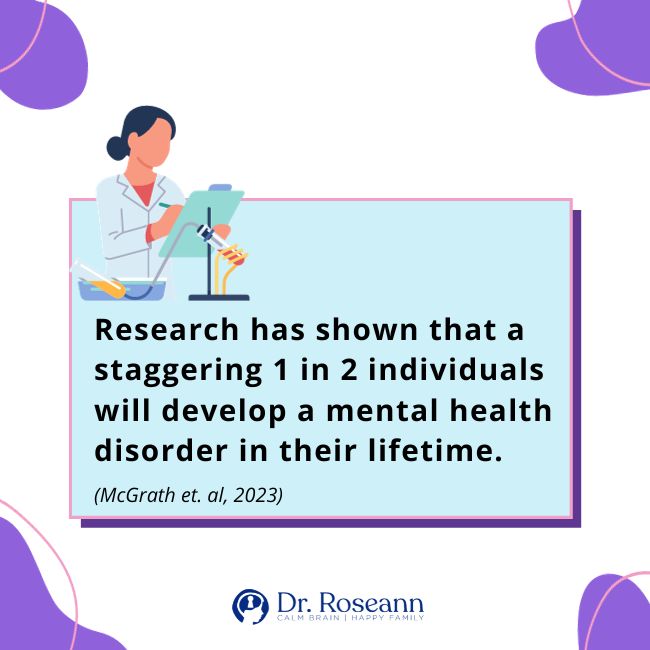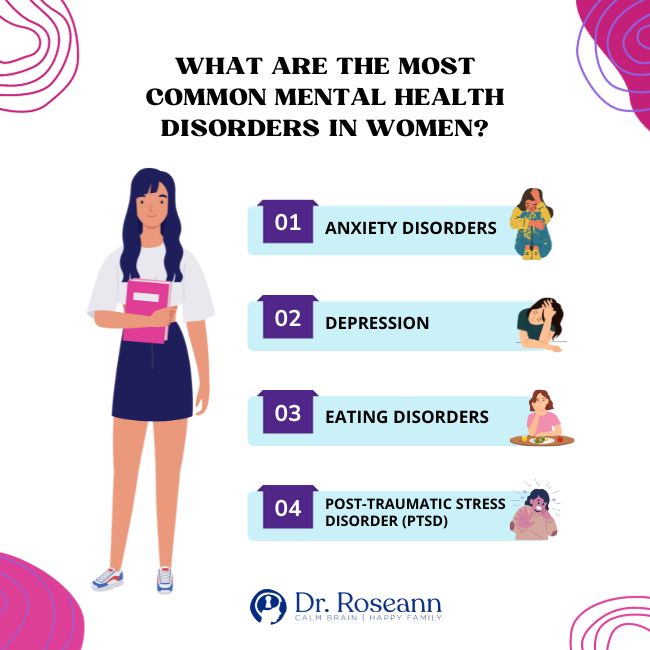Some vital research about mental health may shed light on how common mental health disorders are in our lives. A recent study by McGarth et al. (2023) tried to determine when and how often people start having mental health problems. Healthcare planning relies on this information.
Researchers obtained information from people worldwide for this study, interviewing over 150,000 people at least 18 years old. They asked questions about specific mental health problems they may have experienced using a unique method to decide when these problems started and how common they were.
How Many People Develop Mental Health Problems?

You might wonder how many people report experiencing mental health issues in that study. Well, let me tell you, the numbers are pretty striking. Research has shown that a staggering 1 in 2 individuals will develop a mental health disorder in their lifetime. Yes, you heard that right – it's like a flip of a coin, and this statistic underlines mental health problems' prevalence.
It proves that mental health problems are common and can happen to anyone. Since they usually start when we're young, schools, families, and doctors play a crucial role and must be ready to help when help is needed. We must ensure people get the proper care and support when they are younger.
What Percentage of People Have Mental Issues?
Now, let's break it down in terms of percentages. Roughly 50% of men and women have experienced mental health problems at some point. That is a significant portion of the population, emphasizing the importance of understanding and addressing mental health concerns.
As data from the study indicates that almost 1 in 2 of people suffer from some mental health problem in their lifetime, it means that by the time a person is 75 years old, about half of them might have experienced these problems. The most common time for these problems to occur or when they are first noticed is around 15 to 20 years old.
What are the Most Common Mental Health Disorders in Women?

Navigating the complexities of mental health is crucial for women, as they face unique biological, social, and environmental factors that can influence their well-being (Chandra & Satyanarayana, 2010). Understanding these challenges allows us to promote better awareness, early intervention, and adequate support.
Anxiety Disorders
Anxiety disorders are common mental health challenges for women. Hormonal fluctuations, societal pressures, and life transitions can contribute to the higher prevalence of generalized anxiety disorder, panic disorder, and social anxiety. Addressing these issues with a comprehensive approach that includes therapy and lifestyle changes can significantly improve women's mental well-being.
Depression
Depression affects women at nearly twice the rate it does men. Biological factors like hormonal changes during menstruation, pregnancy, and menopause can contribute to this disparity. Societal expectations and juggling family and career can also play a role. Women must seek professional help if they experience persistent sadness, loss of interest, and fatigue, as early intervention dramatically enhances the chances of recovery.
Eating Disorders
Anorexia, bulimia, and binge eating disorder disproportionately impact women. These disorders often stem from a complex interplay of biological, psychological, and sociocultural factors.
Unrealistic beauty standards exacerbate these conditions. Promoting body positivity, healthy relationships with food, and seeking therapy are integral to treatment.
Post-Traumatic Stress Disorder (PTSD)
Women are more likely to experience PTSD due to the higher likelihood of exposure to traumatic events such as physical or sexual assault. Trauma-informed care and therapy are essential in helping women process and heal from such experiences. A supportive network can also aid in preventing long-term psychological distress.
What are the Most Common Mental Health Disorders in Men?
Conversely, men also grapple with their own set of prevalent mental health disorders. Topping the list is major depression, demonstrating that this mood disorder affects both genders significantly.
Understanding the unique challenges that men face is vital for promoting their well-being. Recognizing these issues builds a society that works towards increased awareness and practical support for men's mental wellness.
Depression
Although often overlooked, depression significantly impacts men's mental health. The societal expectations of masculinity, which discourage emotional vulnerability, can lead to underreporting depressive symptoms.
Men might manifest depression through irritability, anger, or substance use. Encouraging open conversations, destigmatizing seeking help, and providing therapy tailored to men's unique needs are key strategies to address this concern.
Anxiety Disorders
Anxiety disorders also affect men but can manifest differently due to societal norms. Men may mask their anxiety behind behaviors like excessive working, risk-taking, or anger. Understanding these signs and creating environments where men feel comfortable expressing their feelings can lead to early detection and proper management.
Substance Use Disorders
Men are statistically more prone to substance use disorders, often as a coping mechanism for stress, anxiety, or emotional struggles (Rosenfield & Mouzon, 2012). It's important to recognize the link between mental health and substance abuse. Providing men with healthy coping strategies and professional assistance can help break the cycle of addiction.
Suicide
Tragically, suicide rates are notably higher among men. It can be attributed to factors such as reluctance to seek help, social isolation, and the expectations of stoicism. Promoting mental health education, establishing supportive networks, and destigmatizing discussions about suicide are essential steps in preventing this grave outcome.
Post-Traumatic Stress Disorder (PTSD)
Men are often exposed to traumatic events such as combat, accidents, and violence, which make them susceptible to PTSD. Recognizing the signs of PTSD and providing specialized trauma-focused therapy can aid men in their recovery journey.
What are the Main Causes of Mental Illness?
Understanding the intricate web of factors contributing to mental illness is essential for effective prevention and treatment. Let's delve into these causes to work towards a more holistic approach to mental well-being.
Genetic Predisposition
Genetics plays a substantial role in mental illness. A family history of bipolar disorder, depression, anxiety, or schizophrenia increases the likelihood of developing mental disorders. While genetics alone don't determine mental illness, they can influence susceptibility. Recognizing this genetic link can guide early intervention and personalized treatment plans.
Neurochemical Imbalance
The brain's intricate chemical balance is a significant factor in mental health. The imbalances in neurotransmitters, such as serotonin, dopamine, and norepinephrine, can lead to mood disorders like depression and anxiety. While neurochemical imbalances can also be influenced by genetics, they can also result from external factors like chronic stress and substance abuse.
Environmental Stressors
External stressors, such as traumatic experiences, abuse, loss, and ongoing stress, can contribute to the development of mental illness. These stressors can disrupt brain function, trigger neurobiological changes, and exacerbate underlying vulnerabilities. Recognizing and managing these stressors and developing healthy coping mechanisms are essential to preventing mental illness.
Biological Factors
The disruptions during critical periods of brain development, prenatal factors, and certain medical conditions can impact mental health. Conditions like hormonal imbalances, thyroid dysfunction, and chronic inflammation can contribute to mood and cognitive disorders. Addressing these biological factors through medical interventions and lifestyle adjustments can positively influence mental well-being.
Psychosocial Factors
Social and psychological factors also significantly contribute to mental health. Childhood experiences, social isolation, poor interpersonal relationships, and societal pressures can all play a role. Nurturing healthy relationships, building resilience, and fostering emotional intelligence are crucial in mitigating the impact of these factors.
Top Takeaways From This Mental Health Research
Knowledge is power and we are not defined by our genetics. Lifestyle factors can have either a positive or negative influence on one’s mental health. Start by sharing your calm and creating a balanced home life. Kids co-regulate off of our level or stress, so self-care is critical.
Parent Action Steps
- Encourage conversations about emotions and mental health.
- Teach your children about mental health from an early age.
- Equip yourself with the knowledge of common signs of mental health issues.
- Promote activities that boost mental well-being, like exercise and nature walks.
- Show children that it's also important to prioritize one's mental well-being.
- Discuss therapy or counseling as a healthy way to manage emotions and seek support.
- Teach your children how to cope with stress and setbacks.
- Be patient and understanding.
- Offer a safe and non-judgmental space for your children to express themselves.
- Consult a mental health professional.
- Download the 147 Therapist-Endorsed Self-Regulation Strategies for Children
- Take our Solutions Matcher to get personalized treatment for your child.
Citations
Chandra, P. S., & Satyanarayana, V. A. (2010). Gender disadvantage and common mental disorders in women. International Review of Psychiatry, 22(5), 513–524. https://doi.org/10.3109/09540261.2010.516427
McGrath, J. J., Al-Hamzawi, A., Alonso, J., Altwaijri, Y., Andrade, L. H., Bromet, E. J., … & Zaslavsky, A. M. (2023). Age Of Onset and Cumulative Risk Of Mental Disorders: A Cross-national Analysis Of Population Surveys From 29 Countries. The Lancet Psychiatry. https://doi.org/10.1016/s2215-0366(23)00193-1
Rosenfield, S., & Mouzon, D. (2012). Gender and Mental Health. Handbooks of Sociology and Social Research, 277–296. https://doi.org/10.1007/978-94-007-4276-5_14
Always remember… “Calm Brain, Happy Family™”
Are you looking for SOLUTIONS for your struggling child or teen?
Dr. Roseann and her team are all about solutions, so you are in the right place!
There are 3 ways to work with Dr. Roseann:
You can get her books for parents and professionals, including: It’s Gonna Be OK™: Proven Ways to Improve Your Child’s Mental Health, Teletherapy Toolkit™ and Brain Under Attack: A Resource For Parents and Caregivers of Children With PANS, PANDAS, and Autoimmune Encephalopathy.
If you are a business or organization that needs proactive guidance to support employee mental health or an organization looking for a brand representative, check out Dr. Roseann’s media page and professional speaking page to see how we can work together.
Dr. Roseann is a Children’s Mental Health Expert and Therapist who has been featured in/on hundreds of media outlets including, CBS, NBC, FOX News, PIX11 NYC, The New York Times, The Washington Post,, Business Insider, USA Today, CNET, Marth Stewart, and PARENTS. FORBES called her, “A thought leader in children’s mental health.”

She is the founder and director of The Global Institute of Children’s Mental Health and Dr. Roseann Capanna-Hodge. Dr. Roseann is a Board Certified Neurofeedback (BCN) Practitioner, a Board Member of the Northeast Region Biofeedback Society (NRBS), Certified Integrative Medicine Mental Health Provider (CMHIMP) and an Amen Clinic Certified Brain Health Coach. She is also a member of The International Lyme Disease and Associated Disease Society (ILADS), The American Psychological Association (APA), Anxiety and Depression Association of America (ADAA) National Association of School Psychologists (NASP), International OCD Foundation (IOCDF) International Society for Neurofeedback and Research (ISNR) and The Association of Applied Psychophysiology and Biofeedback (AAPB).
© Roseann-Capanna-Hodge, LLC 2023
Disclaimer: This article is not intended to give health advice and it is recommended to consult with a physician before beginning any new wellness regime. *The effectiveness of diagnosis and treatment vary by patient and condition. Dr. Roseann Capanna-Hodge, LLC does not guarantee certain results.













